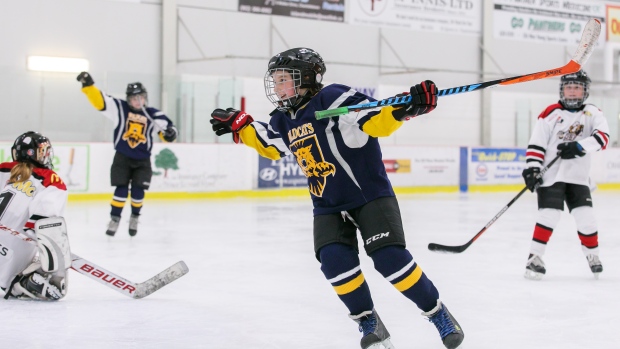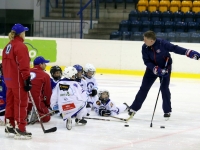Playing the sport of hockey is a wonderful opportunity for a child to develop a sense of teamwork. Being part of a cohesive hockey team where all the players are supportive, empathetic, and operate as a single, smooth unit out on the ice can be very formative for any player. It turns out, however, that having great team chemistry is crucial for every hockey team at any age and skill level. But exactly how important is chemistry for the success of a team? And what ingredients go into the making of a unified team?
Here are three successful qualities of a team with top-notch chemistry:
1) Clear Leadership
This comes in two forms: first, a standout player and second, a great coach.
It’s a huge benefit to any hockey team to have a player that has a unique demeanor, attitude and outlook. A player who’s in it entirely for the team; one whom everyone else can look up to for motivation, advice and leadership. A player with excellent communication and the ability to keep their team focused on the task at hand: putting the puck in the net by any means possible.
We’ve seen it time and time again throughout history with players like Wayne Gretzky, Scott Stevens and Mario Lemieux. People like this contribute hugely to the sense of teamwork and morale. This can go a very long way to improving the success of a hockey team.
And just like the sort of players mentioned above, a coach also needs to be a source of motivation and leadership for their team. A coach who exhibits passion, humility and empathy, along with outstanding command and leadership is a key ingredient to a highly functional hockey team.
2) Hockey Players with Great Attitude
To achieve cohesiveness, every member of the team should be in the right headspace, and driven towards success. Not just success as an individual, but success for their team. This attitude involves leaving egos at the door, and remembering that one person can’t make a team, but one person can certainly break a team. A player should always be willing to support their teammates, give them advice and encouragement, and remind them that everyone is working towards an important, common goal: achieving the team’s best possible performance on the ice.
In addition, a player should be able to manage their expectations and be ready to make a change regarding their ice time, playstyle, or training if their coach suggests it. Sometimes, a player must make a personal sacrifice to advance the performance of their team. If every player shares that mindset, a skilled coach will be able to mold their team in whatever way they see fit to maximize the chances of success
3) Team Chemistry begins with Respect – on and off the Ice
One of the largest contributing factors to a hockey team’s chemistry is the level of respect that the members give one another. On the ice, players should trust and respect the abilities of their teammates, which will allow them to more closely follow their coach’s advice and work together to score. Players are way more likely to make plays that rely on their teammates if they respect their capabilities. Off the ice, all players should respect one another as individuals. There is nothing better than mutual respect for fostering comradery and a willingness to help others.
The key is to create a real desire in a player to see their teammates succeed; to be happy not just for when they, themselves do well, but for when all their comrades do well too. So long as the players are respectful and friendly in every interaction, not just in the rink, the team’s effort towards winning collectively increases.
There is no doubt that good team chemistry is required to succeed in hockey. This is a concept which is becoming more and more important in the sport. If you analyze any age and skill level of hockey, it’s easy to tell that top-notch chemistry always separates the champions from the rest of the pack. Because of this, every hockey team should strive to achieve the best cohesion possible; a key ingredient on the road to victory.






